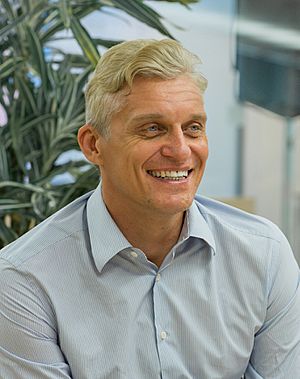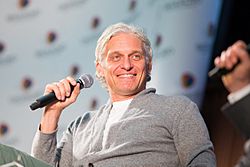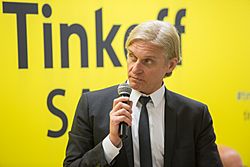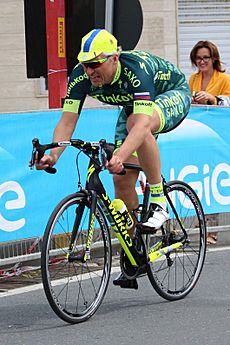Oleg Tinkov facts for kids
Quick facts for kids
Oleg Tinkov
|
|
|---|---|
| Олег Тиньков | |

Tinkov in 2015
|
|
| Born |
Oleg Yuryevich Tinkov
25 December 1967 Polysayevo, Russian SFSR, Soviet Union
|
| Citizenship | Cyprus Russia (until 2022) United States (1996–2013) |
| Occupation | Founder of T-Bank |
| Years active | 1988–present |
| Spouse(s) |
Rina Vosman
(m. 2009) |
| Children | 3 |
Oleg Yuryevich Tinkov is a famous entrepreneur who was born in Russia. He is known for creating many successful businesses, including the popular online bank, T-Bank. For a time, he was a billionaire.
Tinkov started many different companies. He created a chain of electronic stores called Technoshock and factories that made frozen foods. He also started the Tinkoff restaurants and breweries. He even had a music label that helped launch popular bands.
In 2019, Tinkov was diagnosed with a serious illness called leukemia. He had to step away from his businesses to focus on his health. After a long and difficult treatment, his cancer went into remission in 2022. This experience led him to start his own charity to help others with leukemia, putting $200 million of his own money into the fund.
Tinkov has also been in the news for his political views. In 2022, he spoke out against the Russian invasion of Ukraine. He said that because of this, he was pressured to sell his shares in Tinkoff Bank. He later gave up his Russian citizenship.
Contents
Early Life and Education
Childhood in Russia
Oleg Tinkov was born in the small village of Polysayevo, Russia. His father was a miner and his mother was a seamstress.
From the age of 12, Tinkov was a passionate road cyclist. He joined cycling clubs and won many competitions. During his training trips, he started his first small business ventures. He would buy items that were hard to find in his hometown and sell them for a profit.
His cycling career was paused for military service from 1986 to 1988.
University Studies
In 1988, Tinkov went to the Mining Institute. The university had many international students, which gave him more opportunities for business. He sold all sorts of things, from jeans and perfume to electronics.
He worked with other students who also became famous entrepreneurs. In 1999, he also spent time studying at the University of California, Berkeley in the United States.
Family Life
While at university, Tinkov met Rina Vosman. They got married in June 2009 after being together for 20 years. They have three children: a daughter, Daria, and two sons, Pasha and Roman.
Career as an Entrepreneur
Technoshock Electronics Stores
In 1992, Tinkov started a business selling electronics from Singapore. At first, he sold them to other stores, but he soon decided to open his own.
In 1994, he opened his first electronics store in St. Petersburg. He later combined his stores under the name Technoshock. These stores were known for selling high-quality, expensive electronics. Technoshock was one of the first companies in Russia to train its salespeople to be experts. The business grew quickly, but in 1997, Tinkov sold the company for $7 million.
Daria Frozen Foods
After selling Technoshock, Tinkov started a company that made frozen foods like pelmeni (a type of dumpling). He named the brand Daria after his daughter.
The company became famous for its creative and funny advertisements. In 2001, Tinkov sold Daria for $21 million to a large holding company.
Tinkoff Brewery and Restaurants
In 1997, Tinkov had the idea to open a brewery combined with a restaurant. He named the beer after his family name, Tinkoff. The first restaurant opened in St. Petersburg in 1998 and was a huge success.
More restaurants opened in major cities across Russia, including Moscow, Samara, and Novosibirsk. He also built two large breweries to produce Tinkoff beer. In 2005, the international beer company Sun Interbrew bought the breweries and the brand for about $200 million.
Tinkoff Bank
In 2006, Tinkov started his most famous project: Tinkoff Bank. It was one of the first banks in Russia to operate completely online, without any physical branches. This new idea helped the bank save money and grow very quickly.
The bank, originally called Tinkoff Credit Systems, became very successful. In 2013, the company was listed on the stock market, which made Tinkov a billionaire. In 2015, the name was changed to Tinkoff Bank.
After he was diagnosed with leukemia, Tinkov sold some of his shares in the bank. He used part of the money to create his charity fund. By 2022, major world events caused the bank's shares to lose value, and Tinkov's wealth decreased significantly.
Passion for Cycling
Tinkov has always loved road cycling. He used his success in business to support the sport. From 2013 to 2016, he owned the professional cycling team Tinkoff.
Sponsoring Cycling Teams
Before owning his main team, Tinkov sponsored other cycling teams. In 2005, he created Tinkoff Restaurants, which later became Tinkoff Credit Systems. This team helped develop many Russian cyclists and competed in major European races.
The team was very successful and eventually became the foundation for the Russian national team, Katyusha.
The Tinkoff Team
In December 2013, Tinkov bought a major cycling team and renamed it Tinkoff. The team featured some of the world's best riders, including Alberto Contador.
Tinkov was a very involved team owner. He often trained with the athletes and attended competitions. When Contador won the famous 2015 Giro d'Italia race, Tinkov celebrated by dyeing his hair pink.
He often said that professional cycling needed to be modernized. In 2016, he decided to stop sponsoring the team and sold it, saying he had invested about 50 million euros over the years.
Recent Years
Health and Charity Work
In March 2020, Tinkov shared that he had been diagnosed with acute leukemia in late 2019. He underwent difficult treatments, including a bone marrow transplant. By December 2020, he announced that he was in complete remission.
This experience inspired him to create the Tinkov Family Foundation in 2021. The charity's goal is to help people with leukemia in Russia. It works to find bone marrow donors, build treatment centers, and train doctors. Tinkov put over $200 million of his own money into the foundation.
Disagreement with the U.S. Government
Tinkov was a U.S. citizen from 1996 to 2013. In 2020, the U.S. government started a legal case against him related to his taxes from when he gave up his citizenship. The case was about a large amount of money. In 2021, Tinkov settled the case by paying over $500 million.
Stance on the War in Ukraine
In April 2022, Tinkov used his Instagram account to criticize the 2022 Russian invasion of Ukraine. He wrote that the war was "crazy" and that "innocent people and soldiers are dying."
He said that after he made these comments, the Russian government pressured him to sell his 35% share in Tinkoff Bank for a very low price. He later announced he was taking his brands, Tinkoff and La Datcha (his luxury vacation homes), out of Russia.
In November 2022, he officially gave up his Russian citizenship because of his opposition to the war.
See also
 In Spanish: Oleg Tinkov para niños
In Spanish: Oleg Tinkov para niños




